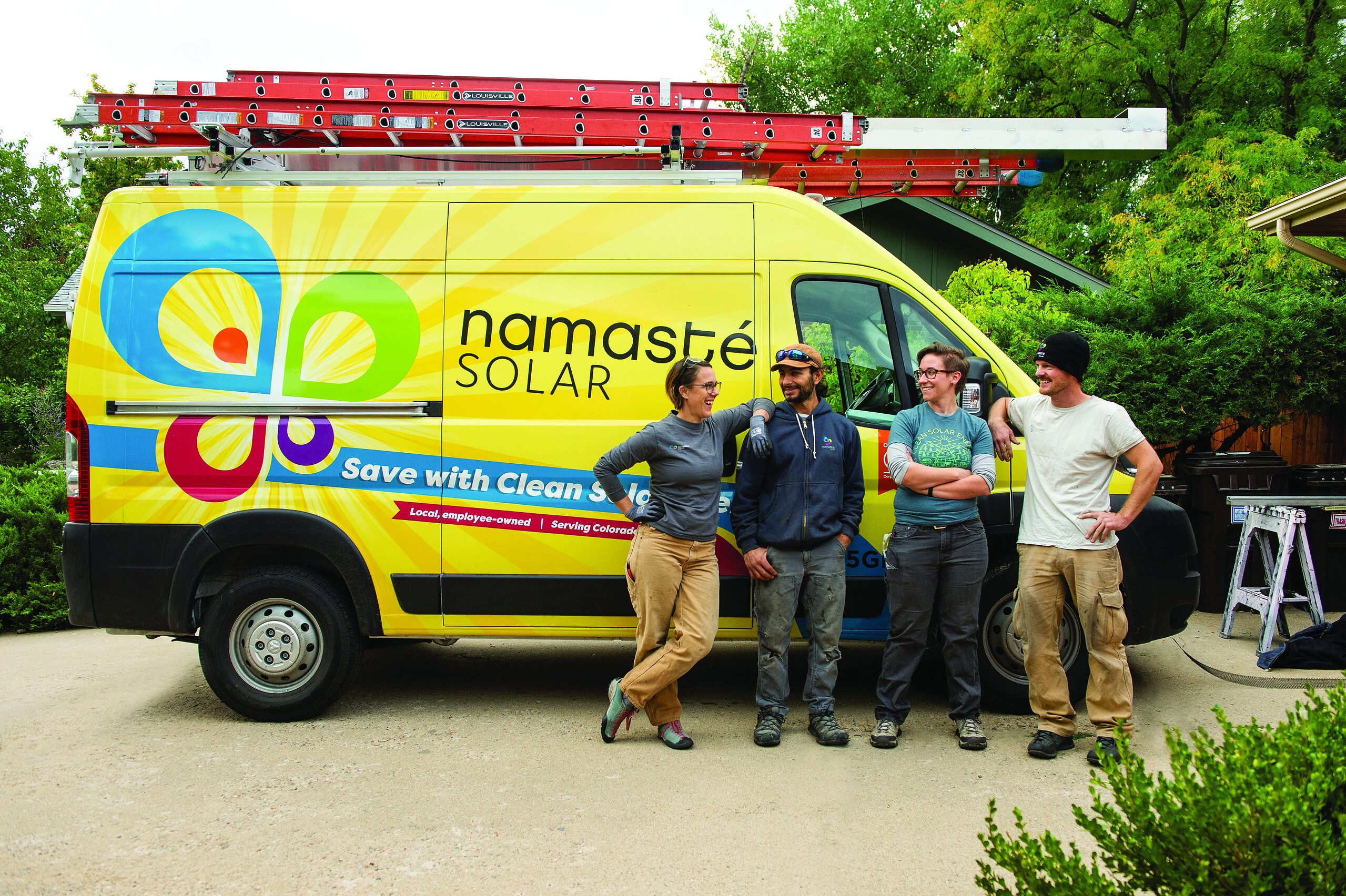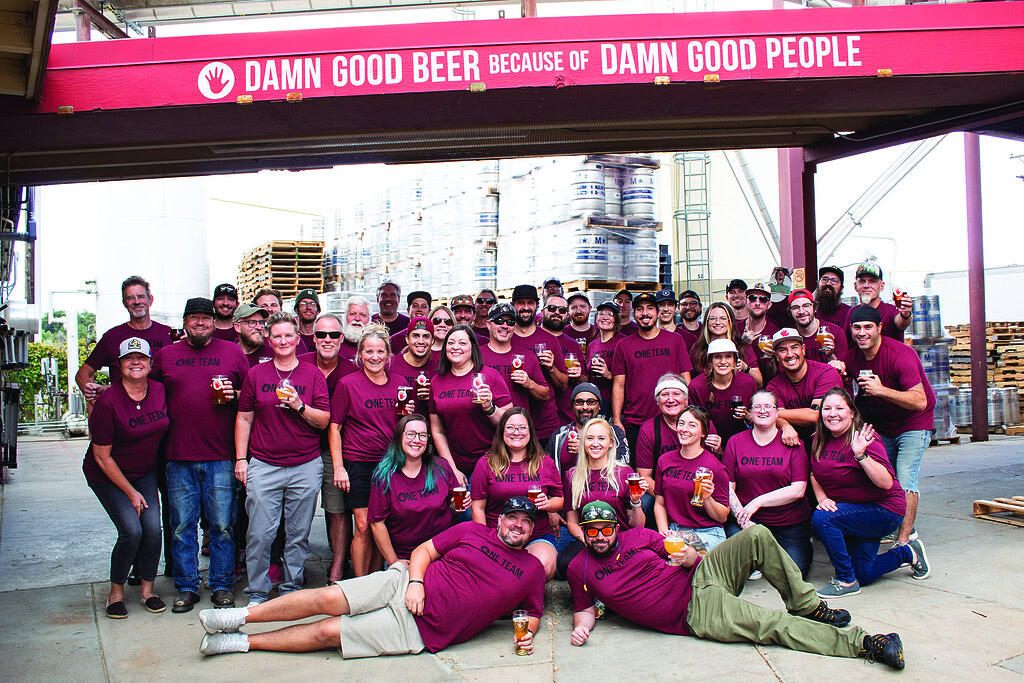
As Boulder Weekly put together our inaugural issue dedicated to workers — and prepare for our own transition to an employee- and community-owned cooperative — we knew employee ownership had to fit in somewhere. Colorado is a hotbed of activity for employee-owned companies, boasting more than 230 such businesses.
The Centennial State is one of three in the U.S. with an office dedicated exclusively to helping companies transition; the Colorado Employee Ownership Office, nestled under the Office of Economic Development, was established in 2020 at the direction of Gov. Jared Polis.
Since then, some 70 companies have converted, according to reporting from The Denver Post — including a handful in Boulder County. Others predate the government’s facilitation of such structures, celebrating a decade or more of employee ownership.
Employee owners interviewed by Boulder Weekly enjoy having a say in business decisions and sharing in the profits. They’ve learned new skills and deepened their relationships to co-workers. While some said taking an ownership stake can be intimidating, across the board, they are grateful for the experience and hopeful for the future.
“At the end of the day, we want to build something that lasts,” said Ethan Shaw, co-founder of Nederland-based employee-owned cannabis brand The Flower Collective (read an interview with Shaw here).
“The only way to do that is build a team that is together looking into the future and going to stick together.”

Namaste Solar
Boulder
Founded in 2005
Employee-owned cooperative since 2011
~200 employees
“What’s the purpose of business? What’s the point of profit?” asks Jason Sharpe, CEO of Boulder’s Namaste Solar. “My dad used to say profit is unpaid wages. What about bringing profits to workers?”
Namaste Solar is an employee-owned cooperative. They strive to bring power to workers, too, Sharpe said, through a policy of financial and operational transparency.
“The idea is that our owners have full access to all the information in our business. Information is power. That’s one of the ways we tried to level the playing field.
“If you’re not at the table, you’re on the menu. We allow access to the table.”
By sharing profits and power, Namaste Solar is fighting against the extractive nature of modern capitalism — appropriate for an organization focused on renewable energy and working to end extraction of fossil fuels from the earth.
“Namaste in some interpretations is the interconnectedness of all things,” Sharpe said. “The ideas of regenerative or circular economies: I think that’s all consistent with worker owners.
“You don’t have one or two people making huge profits. You have a lot of people building something that’s more sustainable.”
The company is celebrating its 20th year in business, notable in the volatile industry. In 2024, more than 100 solar companies declared bankruptcy, according to insurance provider Solar Insure.
“Twenty years as a business,” Sharpe said, “that feels like something to celebrate.”

More worker-owned companies
Find a complete list and interactive map of Colorado's employee-owned businesses at oedit.colorado.gov/colorado-employee-ownership-office#eomap
Leanin’ Tree
Mead*
Founded in 1949
Employee Stock Ownership Plan (ESOP) since 2022
~150 employees
*Leanin' Tree relocated from Gunbarrel in October 2024
One of the first emotions Susan January remembers upon hearing Leanin’ Tree would become employee owned was fear.
“The terrifying part was who is in charge now?” she recalled. “What’s our five-year plan?”
The greeting card company had been under the ownership of Ed Trumble and his family for more than 70 years when board members came to the Gunbarrel offices to make the surprise announcement.
“They sort of shared the news first with the management team, and then within a few hours, with the whole company workforce at an all-hands meeting,” January said. “It was kind of shocking and exciting and terrifying all at once.”
The shock and fear vanished quickly as employees looked around and realized their livelihoods were now in the hands of, as January put it, “seasoned people.”
“This is just a company [where] people come and they stay,” she said. “Our longest tenured employee just had her 43rd anniversary. We have people who have never worked anywhere else.” January herself has been with Leanin’ Tree for 28 years.
That “confidence in each other” helped folks settle into their new roles as co-owners, January explained. The company’s culture had always been highly respectful and collaborative, but being responsible for its future gave a greater urgency to the job.
“Rather than employees being invested in building the family’s wealth, it’s about building each other’s wealth and retirements,” she said. “This is an investment of all my fellow owners, and I need to be a good steward of it. It’s all of our money.
“Leanin’ Tree was built from the ground up; we’re heading into our 76th year. We certainly want to shepherd that forward. Who would be better stewards than people who have invested decades of their careers?”

Pumphouse Brewery
Longmont
Established in 1996
Employee owned since 2022
74 employee owners
“Oh gosh, what is this going to be? Are they going to try to change everything?”
These were fair questions to have when the Pumphouse Brewery staff heard their restaurant was being bought out in 2022.
“That is a really important part of the succession puzzle,” said Conrad Legendy, the Pumphouse president who was brought on during the ownership transition. “You won’t have to think too hard to think of a restaurant that was great until the original owner sold it.”
But so far at the Longmont brew pub, those fears of change seem to be assuaged. When Pumphouse’s new parent company Teamshares acquired the restaurant, they had the same mission as they do with the 90 businesses they own across the country: Give it to the employees.
“They’re just looking for stable small businesses that have been around for a while and that don’t really have a succession plan in place,” Legendy said. Once Teamshares adds the businesses to their portfolio, their goal is to reach 80% employee ownership within 20 years by directly issuing stocks to employees.
“They have this core belief that if you give your employees a stake in the business, they’re going to care about it, and that is going to result in outsized financial performance for any given company,” Legendy said. “Having a stake in a company’s success is something which is fairly standard for many white collar workers, but it is not at all standard for most blue collar workers.”
This ethos manifests in the little touches workers have on the business, Legendy said, like planting flowers at the entrance, taking ownership over training new hires or testing new cocktail recipes to shake up the menu.
“Where I think there’s some magic is when you have people who don’t need to be asked to do something that benefits us collectively,” Legendy said, “who just want to do it, because this is more than a job. This is a career.”
Right now, just under 17% of the company belongs to the 74 employees at Pumphouse, and business is steady.
“I would like to think that over the last two-plus years, both our staff have gotten comfortable with the fact that, OK, things are not fundamentally changing,” Legendy says, “But more importantly, our community and our guests that keep us in business, they’ve also seen that things are still good.
“The Pumphouse is still the Pumphouse.”

Left Hand Brewing
Longmont
Established in 1993
Employee owned since 2015
44 employee owners
Whether you’re a brewer, beertender or busser, being employed at Longmont’s Left Hand Brewing Co. means one thing: ownership.
Left Hand has been a stalwart in the Boulder County craft beer scene since 1993 when founder Eric Wallace brought his passion for home brewing to the public. When Wallace opened the doors, he had a vision, not just to serve up frothy stouts, but to build a community and find employees that were just as dedicated to building a successful, independently owned small business as he was.
“That’s just always been his ethos,” said Jill Preston, Left Hand’s director of marketing. “His ultimate goal was to be at least partially employee owned, because then people are more invested.”
Left Hand first started its ESOP in 2015 to incentivize staff to own their work and invest in their futures — both personally and professionally.
Along with collecting dividends and saving for retirement, Left Hand’s model has opened the door for employees to join weekly meetings where they pore over key performance indicators and financials.
“Working as a bartender or brewer, you can get stuck in your silo,” said accounting manager Nick Wiedrich, “but the ESOP encourages [employees] to learn and understand and to participate and to think about continuous improvements.”
This policy of transparency taps into the perspective of someone who rolls up their sleeves every day to provide creative solutions. Last summer, an employee suggested Left Hand start using the same can lid for every beer, rather than different lids depending on the brew inside. “It adds up to a few thousand dollars in savings each year,” Wiedrich said, a margin that directly impacts the employees’ financial benefit.
Right now, the 44 Left Hand employees invested in the ESOP own roughly 5-7% of the company. While it’s uncommon for lifelong workers to ride off into the sunset — the company had its first retirement just last year — there’s just as much value in the intangibles.
“Left Hand doesn’t have to be your only job you’ve ever had. But [we are] at least hopeful that when you leave here, you’ve gained more of these skills and understanding of how businesses operate,” Wiedrich said. “It’s all about trying to grow you, not only to be a better employee, but just understand stuff to help you.”

Trident Booksellers and Cafe
Established in 1980
Employee owned since 2020
~29 employees
Aleah Matthews-Runner used to do their middle school homework at Trident, tucked into a corner table. Today, they are assistant manager and part-owner of the longtime coffee shop and bookstore, helping to make decisions about budgets and marketing.
“You get the craziest and coolest ideas from people who otherwise might not have a say,” they said. “It’s just a place where if you have a vision, you can make it a reality.”
There are 19 owners, a mix of employees who bought in and legacy owners. That works well for the 45-year-old bookstore and coffee shop, Matthews-Runner said, with employees involved in the day-to-day decision making and owners who hold more shares providing a backstop for any big, unexpected expenses — including a potential, eventual purchase of the building at 909 Pearl St.
“We can really have a system where just because we don’t all own the same amount of shares, we are able to speak on equal terms with everyone,” they said.
Having a window into business operations and finances has given Matthews-Runner a chance to flex skills learned in college and pick up some new ones. An “artsy” communications major, their job now involves thinking about profit and loss statements, hiring and retention, price setting and purchasing.
“I’ve learned a ton about what it takes to run a business,” they said. “Owning the means of production actually takes a lot of work.”
Matthews-Runner has become something of an evangelist for employee ownership, which they believe is the key to a strong community.
“It is really exciting to see more people getting into employee ownership, because it means we get more of a say in how our community is run,” they said. “In terms of having communities that can withstand economic toil, that’s where resilience comes from.”
This story was produced by Tyler Hickman and Shay Castle
